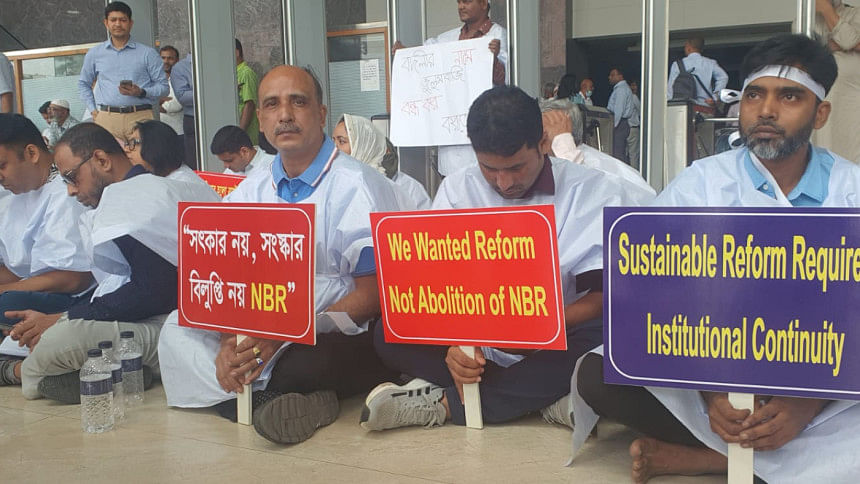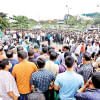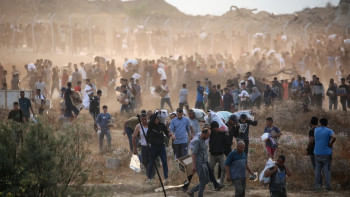Shutdown is another economic peril

As Bangladesh navigates a precarious economic recovery, a total shutdown of the country's customs and tax operations is another disruption the nation cannot afford. Yet that is precisely the reality the economy is now confronting.
Vowing to continue an indefinite work stoppage and stage a protest march on tax offices, the NBR Reform Unity Council has intensified its demands, including the removal of the NBR chairman. As the shutdown enters its second day, port clearances and tax functions remain paralysed, straining already fragile trade flows.
While the grievances voiced by protesting revenue officials stem from frustrations with top-down reform efforts, the tactics of crippling the tax machinery threaten to damage the economy.
The current standoff has its roots in a sweeping overhaul of the National Board of Revenue, proposed under an ordinance backed by the International Monetary Fund. The ordinance would split the NBR into two distinct divisions -- one responsible for tax policy and the other for revenue collection -- in a move the government said was aimed at eliminating conflicts of interest between policymaking and implementation.
After weeks of tension within the revenue administration, the government on May 25 announced a clear timeline to finalise amendments to the Revenue Policy and Revenue Administration Ordinance by July 31. The plan, issued through an official press release, pledged consultations with all relevant stakeholders, including those aligned with the protest. The finance ministry announced that the NBR would instead be transformed into a specialised, autonomous agency.
Against this backdrop, the decision by the protesters to go for a full-scale shutdown well before the expiry of that deadline appears, at best, premature. Concerns over exclusion from dialogue are logical, but the shutdown of the revenue system is not.
This raises questions in government and business circles about the timing and intent of the protest. With formal discussions now scheduled to begin on July 1, this disruption is unnecessary.
That said, the government also bears responsibility for letting the crisis fester. Despite repeated calls for dialogue, the finance ministry has so far chosen to engage only with senior NBR leadership, sidelining protest leaders. This one-sided approach has deepened mistrust and reinforced perceptions that the reform process is being driven by control rather than consensus.
What began as a policy dispute is now increasingly viewed as a clash of egos between a defiant bloc of protesters and the NBR's top leadership and the finance ministry. Personal mistrust and institutional battles are now influencing outcomes.
To restore normalcy and protect the broader economy, it would be prudent for the finance ministry to initiate direct engagement with the Reform Unity Council immediately. That means sitting down with those on the front lines of the protest, hearing their concerns in good faith, and working toward a negotiated settlement. Dialogue is not a concession -- it is the foundation of any durable reform.
The protesters argue that they were excluded from the government's June 19 committee tasked with drafting revisions to the ordinance, despite being the officials expected to implement those changes. They also cite public remarks by the NBR chairman questioning the Council's legitimacy and point to the abrupt transfers of five senior officials on June 21 and 22 as retaliatory.
As the shutdown continues, businesses are feeling the pressure. Export shipments are stalled, goods remain stranded at ports, and previously cleared consignments cannot move due to suspended customs scans.
Protesters say they are ready to meet with the finance adviser "at any time". The upcoming July 1 meeting offers a pathway to resolution. But it is also a reminder that governance disputes, no matter how deep, require patience and respect for institutional process. The Reform Unity Council's inclusion in that discussion is a positive development.
Still, the cost of reaching this point -- a nationwide shutdown of customs and tax operations, disrupted trade, and shaken investor confidence -- could have been avoided had both sides shown a greater willingness to engage earlier and more constructively.
Both sides must now step back from the brink.
Protesters need to recognise that halting core state functions indefinitely undermines the economy and the very public institution they work for.
For its part, the government should move swiftly to de-escalate. The path forward lies not in punitive transfers or continued exclusion of dissenting voices, but in principled dialogue and institutional inclusion.
There is no reason for that conversation to wait until July 1. With political will, it can -- and should -- begin now.

 For all latest news, follow The Daily Star's Google News channel.
For all latest news, follow The Daily Star's Google News channel. 




Comments